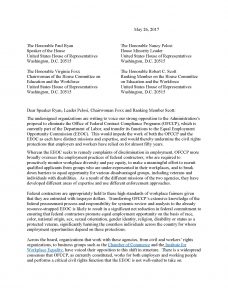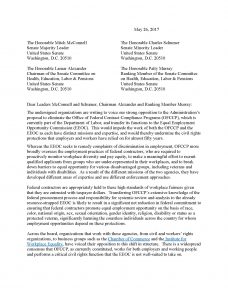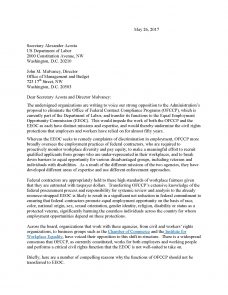

The undersigned organizations are writing to voice our strong opposition to the Administration’s proposal to eliminate the Office of Federal Contract Compliance Programs (OFCCP), which is currently part of the Department of Labor, and transfer its functions to the Equal Employment Opportunity Commission (EEOC). This would impede the work of both the OFCCP and the EEOC as each have distinct missions and expertise, and would thereby undermine the civil rights protections that employers and workers have relied on for almost fifty years.
Whereas the EEOC seeks to remedy complaints of discrimination in employment, OFCCP more broadly oversees the employment practices of federal contractors, who are required to proactively monitor workplace diversity and pay equity, to make a meaningful effort to recruit qualified applicants from groups who are under-represented in their workplaces, and to break down barriers to equal opportunity for various disadvantaged groups, including veterans and individuals with disabilities. As a result of the different missions of the two agencies, they have developed different areas of expertise and use different enforcement approaches.
Federal contractors are appropriately held to these high standards of workplace fairness given that they are entrusted with taxpayer dollars. Transferring OFCCP’s extensive knowledge of the federal procurement process and responsibility for systemic review and analysis to the already resource-strapped EEOC is likely to result in a significant net reduction in federal commitment to ensuring that federal contractors promote equal employment opportunity on the basis of race, color, national origin, sex, sexual orientation, gender identity, religion, disability or status as a protected veteran, significantly harming the countless individuals across the country for whom employment opportunities depend on these protections.
Across the board, organizations that work with these agencies, from civil and workers’ rights organizations, to business groups such as the Chamber of Commerce and the Institute for Workplace Equality, have voiced their opposition to this shift in structure. There is a widespread consensus that OFCCP, as currently constituted, works for both employers and working people and performs a critical civil rights function that the EEOC is not well-suited to take on.
Briefly, here are a number of compelling reasons why the functions of OFCCP should not be transferred to EEOC.
First, eliminating OFCCP and transferring its authority to EEOC would jeopardize the uniquely important missions of each agency and weaken the federal government’s ability to effectively enforce our nation’s civil rights laws. OFCCP enforces rights beyond those that the EEOC enforces and its staff possesses extensive training and expertise in the procurement process that the EEOC staff does not have and would take years to develop. It protects the rights of all active duty wartime veterans, oversees affirmative responsibilities contractors have for hiring qualified individuals with disabilities, enforces explicit protections against discrimination based on sexual orientation and gender identity, and provides broad protections against retaliation for inquiring about compensation. The EEOC’s authority to protect against discrimination on the basis of gender identity and sexual orientation, while well founded in case law, is the subject of ongoing litigation, which amplifies the importance of OFCCP’s role in protecting lesbian, gay, bisexual and transgender (LGBT) workers from discrimination.
Next, OFCCP does not just remedy individual instances of discrimination, but rather, works with contractors to ensure that they meet higher standards of fairness and opportunity with regard to their employment practices that comes with taxpayer dollars. When companies are awarded federal contracts, they not only agree to refrain from discrimination based on protected characteristics, they agree also to take affirmative steps to promote employment opportunities for individuals who are members of certain under-represented groups. OFCCP ensures that companies use a broad set of tools to help attract and find diverse applicant pools and its regulations require federal contractors to regularly review their hiring, pay and promotion practices to promote workplace diversity and pay equity. The EEOC enforces no such proactive requirement and it lacks the expertise in the federal procurement process that is central to OFCCP’s work and success.
Relatedly, OFCCP’s primary mission, unlike that of the EEOC, is to undertake systemic compliance reviews to identify hiring and wage discrimination and other forms of discrimination. Through its comprehensive compliance reviews, OFCCP compares the composition of the pool of applicants for a contractor’s open positions with the composition of the group who were hired, and the wages of employees of one race, sex, or national origin with those of employees of other groups. If those comparisons indicate possible unlawful discrimination, OFCCP further examines the contractor’s practices and works with the contractor to eliminate any discrimination identified. By contrast, the EEOC only has the authority to investigate charges of discrimination, and in conducting its investigation of any particular charge, cannot request data about matters not raised by the charge. In particular, because applicants and employees are unlikely to know the reason they weren’t hired or how their wages compare to their coworkers, EEOC pursues relatively few charges of hiring or wage discrimination.
Nor does the EEOC have the capacity to absorb OFCCP’s many unique functions, harming the EEOC’s ability to fulfill its existing more expansive enforcement priorities. The EEOC has an extremely heavy workload and a well-known backlog of over 70,000 open yet unresolved cases. OFCCP systemic, affirmative compliance responsibilities cover employers employing nearly a quarter of the civilian workforce. This is an extensive set of enforcement responsibilities that an already over-burdened and under-resourced EEOC, which has existing enforcement priorities that extend beyond the pool of employers OFCCP oversees, does not have the capacity to absorb, especially in light of the draconian budget cuts contemplated by the Administration and Congress.
Finally, pursuant to longstanding working agreements, OFCCP and the EEOC already closely coordinate to avoid duplication of effort and promote efficiency between their operations. Thus, eliminating a vital civil rights enforcement agency with a unique mission to promote proactive workplace diversity efforts and pay equity isn’t about efficiency or saving money; it’s about making it more difficult for federal civil rights agencies to enforce the laws that promote equal opportunity and protect working people from discrimination.
We urge you to oppose any efforts to eliminate OFCCP and transfer its functions to the EEOC, and to maintain these two vital and distinct agencies. We welcome any questions you may have about this matter. You may direct all inquiries to Emily Martin, General Counsel and Vice President for Workplace Justice at the National Women’s Law Center, [email protected].
Thank you in advance for your attention to this matter.
Sincerely,
9to5, National Association of Working Women
A Better Balance
AFL-CIO
Alliance for Justice
American Association for Access, Equity and Diversity (AAAED)
American Association of People with Disabilities
American Association of University Women (AAUW)
American Civil Liberties Union
American Federation of State, County and Municipal Employees (AFSCME)
American Foundation for the Blind
Americans for Democratic Action (ADA)
Bazelon Center for Mental Health Law
Bend the Arc Jewish Action
Center for American Progress
Center for Community Change
Center for Law and Social Policy (CLASP)
Communications Workers of America
Demos
Disability Power & Pride, Inc.
Disability Rights Education and Defense Fund
Economic Policy Institute
Epilepsy Foundation
Equal Pay Today!
Equal Rights Advocates
Family Values @ Work
Futures Without Violence
Human Rights Campaign
Institute for Science and Human Values, Inc.
Interfaith Worker Justice
Jewish Women International (JWI)
Labor Council for Latin American Advancement (LCLAA)
Labor Project for Working Families
Lambda Legal
Lawyers’ Committee for Civil Rights Under Law
The Leadership Conference on Civil and Human Rights
Legal Aid at Work
Legal Voice
Main Street Alliance
Make It Work
Minority Business Enterprise Legal Defense and Education Fund
NAACP
National Asian Pacific American Women’s Forum
National Center for Law and Economic Justice
National Center for Lesbian Rights
National Center for Transgender Equality
National Council of Jewish Women
National Council of La Raza
National Council on Independent Living
National Disability Rights Network
National Domestic Workers Alliance
National Education Association
National Employment Law Project
National Employment Lawyers Association (NELA)
National Guestworker Alliance
National LGBTQ Task Force
National Organization of Nurses with Disabilities (NOND)
National Organization for Women
National Partnership for Women & Families
National Urban League
National Women’s Law Center
NETWORK Lobby for Catholic Social Justice
Oxfam America
Paralyzed Veterans of America
PolicyLink
Sargent Shriver National Center on Poverty Law
Service Employees International Union (SEIU)
Taskforce on Tradeswomen’s Issues
UltraViolet
United Spinal Association
The Voter Participation Center
Women Employed
Workplace Fairness
YWCA USA


